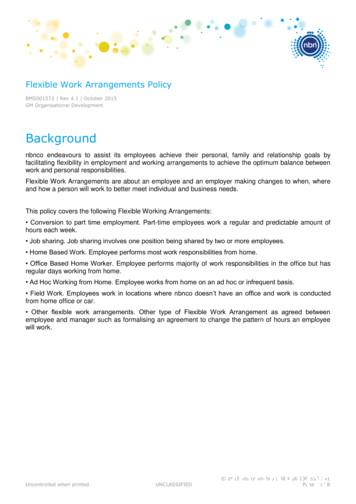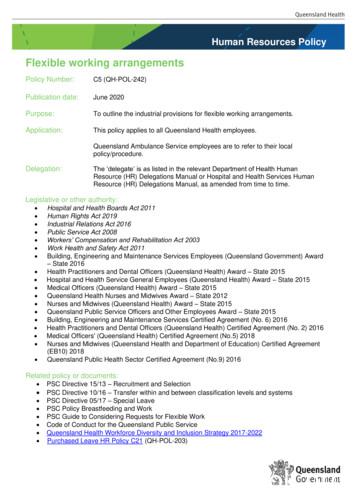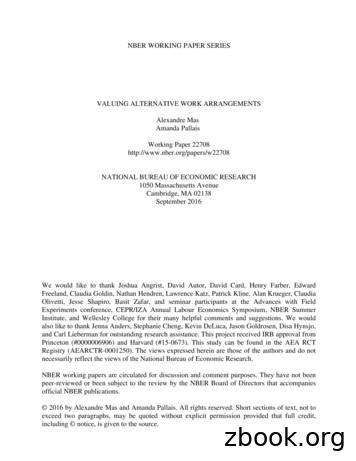Flexible Work Arrangements Policy - Nbnco .au
Flexible Work Arrangements PolicyBMS001572 Rev 4.1 October 2015GM Organisational DevelopmentBackgroundnbnco endeavours to assist its employees achieve their personal, family and relationship goals byfacilitating flexibility in employment and working arrangements to achieve the optimum balance betweenwork and personal responsibilities.Flexible Work Arrangements are about an employee and an employer making changes to when, whereand how a person will work to better meet individual and business needs.This policy covers the following Flexible Working Arrangements: Conversion to part time employment. Part-time employees work a regular and predictable amount ofhours each week. Job sharing. Job sharing involves one position being shared by two or more employees. Home Based Work. Employee performs most work responsibilities from home. Office Based Home Worker. Employee performs majority of work responsibilities in the office but hasregular days working from home. Ad Hoc Working from Home. Employee works from home on an ad hoc or infrequent basis. Field Work. Employees work in locations where nbnco doesn’t have an office and work is conductedfrom home office or car. Other flexible work arrangements. Other type of Flexible Work Arrangement as agreed betweenemployee and manager such as formalising an agreement to change the pattern of hours an employeewill work.Uncontrolled when printedUNCLASSIFIED 2015 nbnco limited ABN 86 136 533 741Page 1 of 8
BMS001572 Rev 4.1PurposeThis policy was developed to ensure that employees and managers are aware of the range of FlexibleWorking Arrangements available at nbnco and understand the roles and responsibilities of each personinvolved in the application and approval processThe availability of these arrangements is subject to individual situations and nbnco’s operationalrequirements.ScopeThis policy applies to all nbnco employees.PolicyFlexible Work Arrangements can assist employees to balance personal needs, while taking into accountbusiness needs. Flexible Working Arrangements may not always be possible due to operational or otherlimitations. Managers and employees need to be open to discussing and considering a range of flexiblework options.Managers are responsible for making a decision about Flexible Working Arrangements following arequest by an employee. Further responsibilities of managers and employees are detailed in the Rolesand Responsibilities section of this policy.Assessing Requests for Flexible Work ArrangementsWhen assessing requests for Flexible Work Arrangements, factors that may be relevant could include: That the new working arrangements requested by the employee would be too costly for theemployerThat there is no capacity to change the working arrangements of other employees toaccommodate the new working arrangements requested by the employeeThat it would be impractical to change the working arrangements of other employees, or recruitnew employees, to accommodate the new working arrangements requested by the employeeThat the new working arrangements requested by the employee would be likely to result in asignificant loss in efficiency or productivityThat the new working arrangements requested by the employee would be likely to have asignificant negative impact on customer service.When assessing requests for Home Working Arrangements, other factors that may be relevant couldinclude: The home based work area provides an appropriate level of privacy and security to enable theemployee to fully comply with nbnco policies relating to the protection of nbnco information,including the Information Security Policy and the Acceptable Use Guidelines. This informationmay be in electronic form, in hardcopy on paper or other media or oral, for example via aconversationan employee's performance prior to making the requestan employee's track record of working autonomouslyan employee's ability to supervise others effectively while working remotely.Uncontrolled when printedUNCLASSIFIED 2015 nbnco limited ABN 86 136 533 741Page 2 of 8
BMS001572 Rev 4.1All Flexible Working Arrangements must be formally requested, agreed and managed in accordance withthis policy.Trial Periods of Flexible Work ArrangementsAny Flexible Working Arrangement approved under this policy should undergo a trial period of up tothree (3) months to ensure the arrangements meet the business requirements of nbnco and the flexibilityrequired by the employee.If the trial is successful and Flexible Working Arrangements are adopted, managers must review thesework arrangements on a regular basis to ensure: All deliverables are being metThe quality, quantity and timeliness of the work performed is to the standard requiredThe impact on other members of the work team is not detrimental to the overall performance ofthe team and companyThe operational requirements of the area are being metThe employee is complying with the terms of the agreementThe Flexible Working Arrangements is continuing to meet the needs of the employee.Work Health and Safety requirements continue to be metnbnco policies and procedures are being adhered to.Cancellation of Flexible Work Arrangementsnbnco reserves the right to cancel any Flexible Working Arrangement with an employee at any timegiving four weeks’ notice following a discussion with the employee.Categories of Flexible Working ArrangementsConverting to Part-time EmploymentAn employee may request to convert to part time employment on a temporary or permanent basis.Any request to convert from full-time to part-time employment needs to be balanced with the operationalrequirements and the needs and impact on other employees in the function.Employees interested in converting to part-time employment should speak to their manager about theirreasons for moving into part-time employment.Job SharingJob sharing involves a position being shared by two or more employees.Employees who share a position will be employed on a permanent part-time basis.Positions under a job share agreement are considered to be part-time (though hours do not have to besplit equally). Job sharing may be initiated by employees but it must be approved by the manager.Approvals will be dependent on the job share arrangement not disadvantaging operational businessperformance.The employees who share a position will agree with their manager how the position is to be divided. Forexample, job share employees could share responsibility for the same work, so that the tasks are notdivided and the job sharing roles are interchangeable. Alternatively, work could be divided on a client,task or project basis.If one of the employees on a job share arrangement leaves the organisation, the other affectedemployee will be consulted to explore alternative job share or flexible work arrangements. nbncoreserves the right to withdraw a job share arrangement if one of the employees leaves nbnco and analternative option is not agreed.Uncontrolled when printedUNCLASSIFIED 2015 nbnco limited ABN 86 136 533 741Page 3 of 8
BMS001572 Rev 4.1Other Flexible Work Arrangementsnbnco will consider other Flexible Work Arrangements proposed by an employee in addition to those setout in this policy such as formalising an agreement to change the pattern of hours an employee willwork. Any such proposal should be discussed with an employee's manager and are subject to policyrequirements and process.Home Based Work (primary work location)Employees may apply to undertake work responsibilities from home. In this case the employee performsmost work from home and the agreement must be formalised in a Letter of Agreement if it is not coveredin the contract of employment. In the interests of promoting co-operative and collaborative workingrelationships, it is essential that an appropriate and agreed amount of the employee’s work time is spentin the office. On these occasions the employee will “hot desk” (i.e. use reasonably available officeworkspace).Office Based Home WorkerEmployees may request to perform the majority of work in the office environment but have regularperiods of working from home (e.g. 3 days per week in nbnco office, 2 days from home). Thearrangement is to be formalised in a Letter of Agreement if it is not covered in the contract ofemployment.Ad Hoc Working from Homenbnco recognises that it may be necessary for an employee to work from home as required on an ad hocbasis.Field WorkerSome employees at nbnco are required to work in locations where nbnco doesn’t have establishedoffices (e.g. in construction management roles) and where their work is conducted partially from theirhome office, their car or as set out in the Contract of Employment. This arrangement is to be formalisedin a Letter of Agreement if it is not covered in the contract of employment.Home Working Arrangement RequirementsHome Working Arrangements are not a substitute for child care or other dependent care. Employees areresponsible for ensuring that appropriate child care or dependent care arrangements are in place whilstengaged in Home Working Arrangements.No face to face meetings are to be held on an employee’s home premises.nbnco policies and procedures in relation to Work Health and Safety apply.For all Home Working Arrangement categories, nbnco will arrange fire and theft insurance of contents,equipment and facilities owned by nbnco.Subject to the terms and conditions of the Comcare workers compensation insurance policy, approvedemployees engaged in Home Working Arrangements will be covered for workers' compensationinsurance.Home Based Work Primary LocationA detailed risk assessment of the home workplace environment must be completed by nbnco’s HealthSafety and Environment assessment provider, and reviewed by an nbnco Health Safety & Environmentrepresentative, before any decision can be made. Should a follow-up risk assessment be required it willbe paid for by nbnco, including one re-assessment to verify that recommended or required correctiveactions have been implemented.Uncontrolled when printedUNCLASSIFIED 2015 nbnco limited ABN 86 136 533 741Page 4 of 8
BMS001572 Rev 4.1Only work environments assessed as Health Safety and Environment compliant will be approved.While nbnco will not be responsible for providing or paying for any facilities required for an employee toconduct Home Working Arrangements, any adjustments, corrective actions or additional equipmentrequired to ensure the safety of the home workplace as recommended by the Health Safety andEnvironment assessment provider will be reasonably considered by nbnco.Upon variation or cancellation, employees are required to return any nbnco equipment that was providedas a result of a Home workplace Health Safety and Environment assessment.nbnco will provide an allowance to cover an appropriate portion of the Internet, phone, lighting andheating etc. The Home Working Allowance amount will be reviewed and amended from time to time atnbnco's discretion.Office Based Home WorkerA detailed risk self assessment of the home workplace environment must be completed by the employeeusing the nbnco Working from Home Health Safety and Environment Checklist. An nbnco Health Safetyand Environment Representative will review this assessment and decide if the workplace is HealthSafety and Environment compliant.With the exception of a portable laptop and headset, nbnco will not be responsible for providing orpaying for any other facilities/equipment required for an employee to conduct Home WorkingArrangements.Ad Hoc Working from HomeIf an employee wishes to work from home on an ad hoc basis, they are responsible for completing adetailed risk self assessment of the home workplace environment using the nbnco Working from HomeHealth Safety and Environment Checklist. An nbnco Health Safety and Environment representative willreview this assessment and decide if the workplace is Health Safety and Environment compliant.nbnco will not be responsible for providing or paying for any facilities required for an employee toconduct ad hoc working from home.Field WorkerAn employee working in their home as part of a field based job must complete a detailed risk selfassessment of the home office / home based workplace environment using the nbnco Working fromHome Health Safety and Environment Checklist. An nbnco Health Safety and Environmentrepresentative will review this assessment and decide if their home workplace environment is HealthSafety and Environment compliant.Only home work environments assessed as Health Safety and Environment compliant will be approved.With the exception of a mobile phone, a portable laptop and headset nbnco will not be responsible forproviding or paying for any facilities required for an employee to conduct working from home.Flexible Work Arrangements Application ProcessThe Flexible Work Arrangements application process is a transparent process which complies withrelevant legislation e.g. Fair Work Act 2009. Detailed information about the application process, alongwith supporting materials like Frequently Asked Questions and Quick Reference Guides can be found onthe Flexible Work Arrangements Space on the Hub.In the first instance an employee should discuss their intention to apply for a Flexible Work Arrangementwith their manager. At this stage, managers may contact the HR Support Centre for policy guidance.Uncontrolled when printedUNCLASSIFIED 2015 nbnco limited ABN 86 136 533 741Page 5 of 8
BMS001572 Rev 4.1nbnco may consider any factors or information it considers relevant on business grounds whenconsidering Flexible Work Arrangement applications and will provide a written response within 21 days(starting from date of submission to the manager).Roles and responsibilitiesManagers are responsible for: Considering each employee application in conjunction with this policy and relevant legislatione.g. Fair Work Act 2009 in deciding if a request can be accommodated and the terms of anyarrangement.Ensuring Flexible Working Arrangements are in line with this policy.Managing differences in work styles and practices e.g. managing employees on a home basedwork arrangement.Tracking the career progression of employees who are on Flexible Work Arrangements toensure they have access to all training and other benefits and to ensure that they suffer nodisadvantage in opportunities for promotion or career developmentProviding the necessary resources and equipment to facilitate Flexible Working Arrangementswithin the context of this policyEvaluating the outcomes of Flexible Working Arrangements and looking for improvementsEnsuring employees on an Ad Hoc Working from Home arrangement enter Ad Hoc Workingfrom Home days into the Employee Manager Self Service (EMSS) system.Employees are responsible for: Identifying personal needs and possible solutions, and being realistic about what is possible Ensuring the physical security of nbnco information and assets at all times when outside of nbncopremises. Taking responsibility for delivering their own workload as agreed with their manager Reporting any workplace incidents, injuries or illnesses that occur whilst undertaking FlexibleWorking Arrangements Reporting any potential hazards that may exist in the Home Working Arrangements environmentas it changes from time to time Ensuring that any Home Working Arrangements comply with all nbnco policies and proceduresincluding Corporate Security and acceptable use guidelines. Reviewing and modifying arrangements as their personal circumstances or operationalrequirements change from time to time.Uncontrolled when printedUNCLASSIFIED 2015 nbnco limited ABN 86 136 533 741Page 6 of 8
BMS001572 Rev 4.1More informationAdditional information is available on the Flexible Working Arrangements space on the HUB.Please contact your Manager or the HR Support Centre if you require additional information in relation tothis policy.Please note that this Policy summarises some of the rights and obligations which are created by thelegislation. The Policy is not intended to go beyond the legislation. This Policy is not a term of anycontract, including any contract of employment, and does not impose any contractual duties on nbnco.This Policy may be varied by nbnco from time to time.Related policiesAcceptable Use GuidelinesEqual Employment OpportunityDiversityHealth Safety and EnvironmentIncident and Hazard ReportingInformation Security PolicyUncontrolled when printedUNCLASSIFIED 2015 nbnco limited ABN 86 136 533 741Page 7 of 8
BMS001572 Rev 4.1GM Organisational DevelopmentOctober 2015Document controlPolicy ownerGM Organisational DevelopmentDocument ID.BMS001572Revision4.1DateOctober 2015Review dateMarch 2016ClassificationUNCLASSIFIEDDissemination limiting marker (DLM)StatusPublishPlan of record?Policy authorRachel RoachePolicy approverMaree TaylorEmailOrganisationRevisionDescriptionPolicy Author4.0FinalDavid Kachor4.1Updated with new nbn branding October 2015Rachel RoacheUncontrolled when printedUNCLASSIFIED 2015 nbnco limited ABN 86 136 533 741Page 8 of 8
work and personal responsibilities. Flexible Work Arrangements are about an employee and an employer making changes to when, where and how a person will work to better meet individual and business needs. This policy covers the following Flexible Working Arrangements: Conversion to part time employment.
Flexible working options are to be considered in an equitable manner for the whole work unit. Client service and patient care is not to be compromised as a result of flexible working arrangements. 3 Submitting a request to access flexible working arrangements Requests for flexible work should be made in accordance with section 27 of the Industrial
working world. FLEXIBLE WORK ARRANGEMENTS MORE THAN JUST WAYS TO MEET THE NEEDS OF THE FUTURE WORKFORCE 03 FWA PRACTICE TYPE Flexible Working Hours Flex-Place Part-Time Employment Increased Maternity/ Paternity Leave Career Breaks Flexible Leave Options* Job Sharing** Source: Hays Asia Salary Guide (Hays PLC, 2016) ADOPTION RATE OF FWA (%) 70 .
of working arrangements that provide a balance between both work and personal obligations. Flexible working arrangements (FWAs) is defined as working conditions that allowed employees to work outside the standard of regular working hours and where the work is performed. Examples of FWAs are working from home (WFH), flexitime, job sharing .
flexible working arrangements need to plan in advance. Talk to your employer as early as possible so that you can both explore what opportunities might be available well ahead of the proposed start date for your flexible working arrangement. How we can all benefit You may already be familiar with flexible working arrangements.
1 Introduction Alternative work arrangements, such as flexible scheduling, working from home, and part-time work are a common and by some measures a growing feature of the U.S. labor market.1 While these arrangements may facilitate work-life balance, they are not necessarily worker-friendly.
arrangements in 1999, offering telecommuting, flexible work schedules and part-time work. The United Nations Secretariat introduced its FWA policy in 2003 (ST/SGB/2003/4) with four options available to staff: staggered working hours; compressed work schedules (ten working days in nine); scheduled break for external .
Flexible Working Policy Purpose and anticipated outcomes of the policy: The policy sets out the process for employees to request flexible working by way of either a temporary or permanent change to hours of work, place of work or times of work. This is in line with, and goes beyond, our statutory o
n Flute, Jazz Flute* n Oboe n Clarinet, Jazz Clarinet* n Bassoon n Saxophone, Jazz Sax* Grades 1–8: Instrumental and singing exams Practical syllabuses are available in over 35 subjects, from Piano to Percussion, and from Harpsichord to Horn. There is a separate Jazz syllabus for Flute, Clarinet, Sax, Trumpet, Trombone, Piano and Ensembles.








